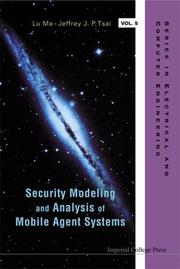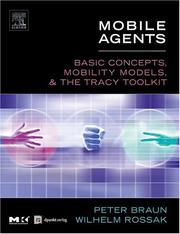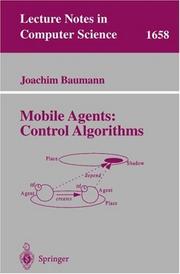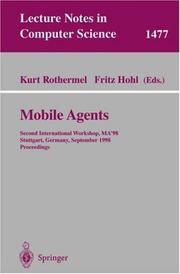| Listing 1 - 10 of 17 | << page >> |
Sort by
|
Book
ISBN: 0201325829 Year: 1998 Publisher: Reading, Mass. Addison-Wesley
Abstract | Keywords | Export | Availability | Bookmark
 Loading...
Loading...Choose an application
- Reference Manager
- EndNote
- RefWorks (Direct export to RefWorks)
Programming --- Mobile agents (Computer software) --- Java (Computer program language) --- Java (Langage de programmation) --- Java (Computer program language). --- Mobile agents (Computer software). --- Agents, Mobile (Computer software) --- Mobile Internet agents (Computer software) --- Intelligent agents (Computer software) --- Object-oriented programming languages --- JavaSpaces technology

ISBN: 1281347558 9786611347550 1860949053 9781860949050 9781860946349 1860946348 9781281347558 6611347550 Year: 2006 Volume: v. 5 Publisher: London ; Hackensack, NJ : Imperial College Press,
Abstract | Keywords | Export | Availability | Bookmark
 Loading...
Loading...Choose an application
- Reference Manager
- EndNote
- RefWorks (Direct export to RefWorks)
A mobile agent system could be attacked by malicious agents, platforms and third parties. Mobile agents simply offer greater opportunities for abuse and misuse, which broadens the scale of threats significantly. In addition, since mobile agents have some unique characteristics such as their mobility, security problems have become more complicated in these systems. These security problems have become a bottleneck in the development and maintenance of mobile agent systems, especially in security sensitive applications such as electronic commerce. This book introduces the concept and structure o
Mobile agents (Computer software) --- Intelligent agents (Computer software) --- Agents, Autonomous (Computer software) --- Agents, Cognitive (Computer software) --- Agents, Intelligent (Computer software) --- Assistants, Cognitive (Computer software) --- Assistants, Intelligent software --- Autonomous agents (Computer software) --- Cognitive agents (Computer software) --- Cognitive assistants (Computer software) --- IAs (Computer software) --- Intelligent agent software --- Intelligent software agents --- Intelligent software assistants --- Software agents (Computer software) --- Special agents (Computer software) --- Artificial intelligence --- Agents, Mobile (Computer software) --- Mobile Internet agents (Computer software) --- Computer programs --- E-books

ISBN: 9781558608177 1558608176 9780080473482 0080473482 3898642984 9783898642989 1281016241 9781281016249 9781493303687 1493303686 9786611016241 6611016244 Year: 2005 Publisher: San Francisco, CA Heidelberg Elsevier :Morgan Kaufmann Dpunkt.verlag
Abstract | Keywords | Export | Availability | Bookmark
 Loading...
Loading...Choose an application
- Reference Manager
- EndNote
- RefWorks (Direct export to RefWorks)
Mobile agents are software nomads that act as your personal representative, working autonomously through networks. They are able to visit network nodes directly using available computing power and are not limited by platform. This emerging field is now poised to become a cornerstone for new Web-based ubiquitous computing environments. Mobile Agents provides a practical introduction to mobile agent technology and surveys the state of the art in mobile agent research. Students and researchers can use the book as an introduction to the concepts and possibilities of this field and as an ove
Mobile agents (Computer software) --- Intelligent agents (Computer software) --- Agents, Autonomous (Computer software) --- Agents, Cognitive (Computer software) --- Agents, Intelligent (Computer software) --- Assistants, Cognitive (Computer software) --- Assistants, Intelligent software --- Autonomous agents (Computer software) --- Cognitive agents (Computer software) --- Cognitive assistants (Computer software) --- IAs (Computer software) --- Intelligent agent software --- Intelligent software agents --- Intelligent software assistants --- Software agents (Computer software) --- Special agents (Computer software) --- Artificial intelligence --- Agents, Mobile (Computer software) --- Mobile Internet agents (Computer software) --- Computer programs
Book
ISBN: 9811074674 9811074666 Year: 2018 Publisher: Singapore : Springer Singapore : Imprint: Springer,
Abstract | Keywords | Export | Availability | Bookmark
 Loading...
Loading...Choose an application
- Reference Manager
- EndNote
- RefWorks (Direct export to RefWorks)
This book presents the latest developments regarding a detailed mobile agent-enabled anomaly detection and verification system for resource constrained sensor networks; a number of algorithms on multi-aspect anomaly detection in sensor networks; several algorithms on mobile agent transmission optimization in resource constrained sensor networks; an algorithm on mobile agent-enabled in situ verification of anomalous sensor nodes; a detailed Petri Net-based formal modeling and analysis of the proposed system, and an algorithm on fuzzy logic-based cross-layer anomaly detection and mobile agent transmission optimization. As such, it offers a comprehensive text for interested readers from academia and industry alike.
Mobile agents (Computer software) --- Sensor networks. --- Computer science. --- Mathematical logic. --- Computer Science. --- Information Systems Applications (incl. Internet). --- Mathematical Logic and Formal Languages. --- Mobile Computing. --- Networks, Sensor --- Detectors --- Context-aware computing --- Multisensor data fusion --- Agents, Mobile (Computer software) --- Mobile Internet agents (Computer software) --- Intelligent agents (Computer software) --- Mobile computing. --- Electronic data processing --- Portable computers --- Informatics --- Science --- Application software. --- Algebra of logic --- Logic, Universal --- Mathematical logic --- Symbolic and mathematical logic --- Symbolic logic --- Mathematics --- Algebra, Abstract --- Metamathematics --- Set theory --- Syllogism --- Application computer programs --- Application computer software --- Applications software --- Apps (Computer software) --- Computer software
Book
ISBN: 9781484274491 Year: 2022 Publisher: Berkeley, CA Apress :Imprint: Apress
Abstract | Keywords | Export | Availability | Bookmark
 Loading...
Loading...Choose an application
- Reference Manager
- EndNote
- RefWorks (Direct export to RefWorks)
Design and build innovative, custom, data-driven Alexa skills for home or business. Working through several projects, this book teaches you how to build Alexa skills and integrate them with online APIs. If you have basic Python skills, this book will show you how to build data-driven Alexa skills. You will learn to use data to give your Alexa skills dynamic intelligence, in-depth knowledge, and the ability to remember. Data-Driven Alexa Skills takes a step-by-step approach to skill development. You will begin by configuring simple skills in the Alexa Skill Builder Console. Then you will develop advanced custom skills that use several Alexa Skill Development Kit features to integrate with lambda functions, Amazon Web Services (AWS), and Internet data feeds. These advanced skills enable you to link user accounts, query and store data using a NoSQL database, and access real estate listings and stock prices via web APIs. What You Will Learn Set up and configure your development environment properly the first time Build Alexa skills quickly and efficiently using Agile tools and techniques Create a variety of data-driven Alexa skills for home and business Access data from web applications and Internet data sources via their APIs Test with unit-testing frameworks throughout the development life cycle Manage and query your data using the DynamoDb NoSQL database engines Who This Book Is For Developers who wish to go beyond Hello World and build complex, data-driven applications on Amazon's Alexa platform; developers who want to learn how to use Lambda functions, the Alexa Skills SDK, Alexa Presentation Language, and Alexa Conversations; developers interested in integrating with public APIs such as real estate listings and stock market prices. Readers will need to have basic Python skills.
Intelligent personal assistants (Computer software) --- Design. --- Agents, Intelligent personal assistant (Computer software) --- Agents, Personal assistant (Computer software) --- Assistant agents, Intelligent personal (Computer software) --- Assistants, Intelligent personal (Computer software) --- Intelligent personal assistant agents (Computer software) --- IPA agents (Computer software) --- IPAs (Computer software) --- Personal assistant agents (Computer software) --- Personal assistants, Intelligent (Computer software) --- Virtual personal assistants (Computer software) --- Intelligent agents (Computer software) --- Mobile agents (Computer software) --- Personal information management. --- Computer programming. --- Computers --- Electronic computer programming --- Electronic data processing --- Electronic digital computers --- Programming (Electronic computers) --- Coding theory --- Information management, Personal --- PIM (Personal information management) --- Management --- Time management --- Agents, Mobile (Computer software) --- Mobile Internet agents (Computer software) --- Programming
Book
ISBN: 1484274482 1484274490 Year: 2021 Publisher: [Place of publication not identified] : Apress,
Abstract | Keywords | Export | Availability | Bookmark
 Loading...
Loading...Choose an application
- Reference Manager
- EndNote
- RefWorks (Direct export to RefWorks)
Design and build innovative, custom, data-driven Alexa skills for home or business. Working through several projects, this book teaches you how to build Alexa skills and integrate them with online APIs. If you have basic Python skills, this book will show you how to build data-driven Alexa skills. You will learn to use data to give your Alexa skills dynamic intelligence, in-depth knowledge, and the ability to remember. Data-Driven Alexa Skills takes a step-by-step approach to skill development. You will begin by configuring simple skills in the Alexa Skill Builder Console. Then you will develop advanced custom skills that use several Alexa Skill Development Kit features to integrate with lambda functions, Amazon Web Services (AWS), and Internet data feeds. These advanced skills enable you to link user accounts, query and store data using a NoSQL database, and access real estate listings and stock prices via web APIs. What You Will Learn Set up and configure your development environment properly the first time Build Alexa skills quickly and efficiently using Agile tools and techniques Create a variety of data-driven Alexa skills for home and business Access data from web applications and Internet data sources via their APIs Test with unit-testing frameworks throughout the development life cycle Manage and query your data using the DynamoDb NoSQL database engines Who This Book Is For Developers who wish to go beyond Hello World and build complex, data-driven applications on Amazon's Alexa platform; developers who want to learn how to use Lambda functions, the Alexa Skills SDK, Alexa Presentation Language, and Alexa Conversations; developers interested in integrating with public APIs such as real estate listings and stock market prices. Readers will need to have basic Python skills.
Intelligent personal assistants (Computer software) --- Mobile agents (Computer software) --- Personal information management. --- Computer programming. --- Computers --- Electronic computer programming --- Electronic data processing --- Electronic digital computers --- Programming (Electronic computers) --- Coding theory --- Information management, Personal --- PIM (Personal information management) --- Management --- Time management --- Agents, Mobile (Computer software) --- Mobile Internet agents (Computer software) --- Intelligent agents (Computer software) --- Agents, Intelligent personal assistant (Computer software) --- Agents, Personal assistant (Computer software) --- Assistant agents, Intelligent personal (Computer software) --- Assistants, Intelligent personal (Computer software) --- Intelligent personal assistant agents (Computer software) --- IPA agents (Computer software) --- IPAs (Computer software) --- Personal assistant agents (Computer software) --- Personal assistants, Intelligent (Computer software) --- Virtual personal assistants (Computer software) --- Programming

ISBN: 3540411925 3540409092 Year: 2000 Publisher: Berlin, Heidelberg : Springer Berlin Heidelberg : Imprint: Springer,
Abstract | Keywords | Export | Availability | Bookmark
 Loading...
Loading...Choose an application
- Reference Manager
- EndNote
- RefWorks (Direct export to RefWorks)
In this monograph, Joachim Baumann provides in-depth coverage of essential research issues; namely, mechanisms for locating and terminating mobile agents and for orphan detection in a mobile agent system. The reader will gain insights into the design and implementation of three control mechanisms for use in mobile agent systems: the energy concept, the path concept, and the shadow concept. The author examines these mechanisms and offers a solid argument as to why they would be better choices over existing mechanisms with respect to message complexity, migration delay, and availability. All in all, this book is an outstanding contribution to advancing the science of mobile agents and it will help the community better understand how to tame mobile agents.
Computer Science --- Engineering & Applied Sciences --- Mobile agents (Computer software) --- Agents, Mobile (Computer software) --- Mobile Internet agents (Computer software) --- Computer science. --- Computer communication systems. --- Software engineering. --- Operating systems (Computers). --- Artificial intelligence. --- Computer Science. --- Computer Communication Networks. --- Artificial Intelligence (incl. Robotics). --- Software Engineering/Programming and Operating Systems. --- Software Engineering. --- Operating Systems. --- Intelligent agents (Computer software) --- Artificial Intelligence. --- Computer operating systems --- Computers --- Disk operating systems --- Systems software --- Computer software engineering --- Engineering --- AI (Artificial intelligence) --- Artificial thinking --- Electronic brains --- Intellectronics --- Intelligence, Artificial --- Intelligent machines --- Machine intelligence --- Thinking, Artificial --- Bionics --- Cognitive science --- Digital computer simulation --- Electronic data processing --- Logic machines --- Machine theory --- Self-organizing systems --- Simulation methods --- Fifth generation computers --- Neural computers --- Operating systems --- Communication systems, Computer --- Computer communication systems --- Data networks, Computer --- ECNs (Electronic communication networks) --- Electronic communication networks --- Networks, Computer --- Teleprocessing networks --- Data transmission systems --- Digital communications --- Electronic systems --- Information networks --- Telecommunication --- Cyberinfrastructure --- Network computers --- Distributed processing --- Computer networks. --- Operating systems (Computers)
Book
ISSN: 1860949X ISBN: 3642248055 3642248063 Year: 2011 Volume: v. 391 Publisher: Berlin : Springer Berlin Heidelberg,
Abstract | Keywords | Export | Availability | Bookmark
 Loading...
Loading...Choose an application
- Reference Manager
- EndNote
- RefWorks (Direct export to RefWorks)
The Workshops on Autonomous Systems emanated from a gathering with the doctoral students of just three chairs at Fernuniversität in Hagen, which we organise twice per year for a number of years now. Their purpose is to discuss on-going research and to create a community spirit. Furthermore, they serve as a means of structuring the students' research processes. The workshop has grown and matured in several respects. The doctoral students presenting their work do not come from a single university anymore, but from three. Besides them and their supervisors, also other scientists became interested in the event and contribute to its programme. Following the model of Advanced Study Institutes, they are available on the premises for relaxed, informal discussions outside the formal sessions. Finally, with the co-sponsorship of Gesellschaft für Informatik, the German Computer Society, and this surprisingly comprehensive volume of contributions published by Springer-Verlag the workshop turned into a visible scientific event.
Intelligent agents (Computer software) --- Engineering & Applied Sciences --- Computer Science --- Mobile agents (Computer software) --- Agents, Mobile (Computer software) --- Mobile Internet agents (Computer software) --- Engineering. --- Artificial intelligence. --- Computational intelligence. --- Computational Intelligence. --- Artificial Intelligence (incl. Robotics). --- Intelligence, Computational --- Artificial intelligence --- Soft computing --- AI (Artificial intelligence) --- Artificial thinking --- Electronic brains --- Intellectronics --- Intelligence, Artificial --- Intelligent machines --- Machine intelligence --- Thinking, Artificial --- Bionics --- Cognitive science --- Digital computer simulation --- Electronic data processing --- Logic machines --- Machine theory --- Self-organizing systems --- Simulation methods --- Fifth generation computers --- Neural computers --- Construction --- Industrial arts --- Technology --- Agents, Autonomous (Computer software) --- Agents, Cognitive (Computer software) --- Agents, Intelligent (Computer software) --- Assistants, Cognitive (Computer software) --- Assistants, Intelligent software --- Autonomous agents (Computer software) --- Cognitive agents (Computer software) --- Cognitive assistants (Computer software) --- IAs (Computer software) --- Intelligent agent software --- Intelligent software agents --- Intelligent software assistants --- Software agents (Computer software) --- Special agents (Computer software) --- Computer programs --- Artificial Intelligence.
Book
ISBN: 3642307361 364230737X Year: 2013 Publisher: Berlin ; New York : Springer,
Abstract | Keywords | Export | Availability | Bookmark
 Loading...
Loading...Choose an application
- Reference Manager
- EndNote
- RefWorks (Direct export to RefWorks)
Complex Automated Negotiations are a widely studied, emerging area in the field of Autonomous Agents and Multi-Agent Systems. In general, automated negotiations can be complex, since there are a lot of factors that characterize such negotiations. For this book, we solicited papers on all aspects of such complex automated negotiations, which are studied in the field of Autonomous Agents and Multi-Agent Systems. This book includes two parts, which are Part I: Agent-based Complex Automated Negotiations and Part II: Automated Negotiation Agents Competition. Each chapter in Part I is an extended version of ACAN 2011 papers after peer reviews by three PC members. Part II includes ANAC 2011 (The Second Automated Negotiating Agents Competition), in which automated agents who have different negotiation strategies and implemented by different developers are automatically negotiate in the several negotiation domains. ANAC is an international competition in which automated negotiation strategies, submitted by a number of universities and research institutes across the world, are evaluated in a tournament style. The purpose of the competition is to steer the research in the area of bilateral multi-issue, closed negotiation. This book includes rules, results, agents and domains descriptions for ANAC2011 submitted by organizers and finalists.
Engineering & Applied Sciences --- Computer Science --- Intelligent agents (Computer software) --- Mobile agents (Computer software) --- Agents, Mobile (Computer software) --- Mobile Internet agents (Computer software) --- Agents, Autonomous (Computer software) --- Agents, Cognitive (Computer software) --- Agents, Intelligent (Computer software) --- Assistants, Cognitive (Computer software) --- Assistants, Intelligent software --- Autonomous agents (Computer software) --- Cognitive agents (Computer software) --- Cognitive assistants (Computer software) --- IAs (Computer software) --- Intelligent agent software --- Intelligent software agents --- Intelligent software assistants --- Software agents (Computer software) --- Special agents (Computer software) --- Engineering. --- Artificial intelligence. --- Computational intelligence. --- Computational Intelligence. --- Artificial Intelligence (incl. Robotics). --- Intelligence, Computational --- Artificial intelligence --- Soft computing --- AI (Artificial intelligence) --- Artificial thinking --- Electronic brains --- Intellectronics --- Intelligence, Artificial --- Intelligent machines --- Machine intelligence --- Thinking, Artificial --- Bionics --- Cognitive science --- Digital computer simulation --- Electronic data processing --- Logic machines --- Machine theory --- Self-organizing systems --- Simulation methods --- Fifth generation computers --- Neural computers --- Construction --- Industrial arts --- Technology --- Computer programs --- Artificial Intelligence.

ISSN: 03029743 ISBN: 354064959X 9783540649595 3540498176 Year: 1998 Volume: 1477 Publisher: Berlin: Springer,
Abstract | Keywords | Export | Availability | Bookmark
 Loading...
Loading...Choose an application
- Reference Manager
- EndNote
- RefWorks (Direct export to RefWorks)
This book constitutes the proceedings of the Second International Workshop on Mobile Agents, MA'98, held in Stuttgart, Germany, in September 1998. The 21 revised full papers presented were carefully selected from a total of 45 submissions; also included are three invited contributions. The book is divided in topical sections on mechanisms for mobile agent systems, mobile agent architechtures, applications, mobile agent systems, security, and communication.
Mobile agents (Computer software) --- Congresses --- 681.3*C24 --- 681.3*C24 Distributed systems: distributed databases; distributed applications; networkoperating systems --- Distributed systems: distributed databases; distributed applications; networkoperating systems --- Agents, Mobile (Computer software) --- Mobile Internet agents (Computer software) --- Intelligent agents (Computer software) --- Computer Communication Networks. --- Artificial intelligence. --- Software engineering. --- Operating systems (Computers). --- Artificial Intelligence. --- Software Engineering/Programming and Operating Systems. --- Software Engineering. --- Operating Systems. --- Computer communication systems. --- AI (Artificial intelligence) --- Artificial thinking --- Electronic brains --- Intellectronics --- Intelligence, Artificial --- Intelligent machines --- Machine intelligence --- Thinking, Artificial --- Bionics --- Cognitive science --- Digital computer simulation --- Electronic data processing --- Logic machines --- Machine theory --- Self-organizing systems --- Simulation methods --- Fifth generation computers --- Neural computers --- Computer operating systems --- Computers --- Disk operating systems --- Systems software --- Computer software engineering --- Engineering --- Operating systems --- Communication systems, Computer --- Computer communication systems --- Data networks, Computer --- ECNs (Electronic communication networks) --- Electronic communication networks --- Networks, Computer --- Teleprocessing networks --- Data transmission systems --- Digital communications --- Electronic systems --- Information networks --- Telecommunication --- Cyberinfrastructure --- Network computers --- Distributed processing --- Mobile agents (Computer software) - Congresses --- Computer networks. --- Operating systems (Computers)
| Listing 1 - 10 of 17 | << page >> |
Sort by
|

 Search
Search Feedback
Feedback About UniCat
About UniCat  Help
Help News
News